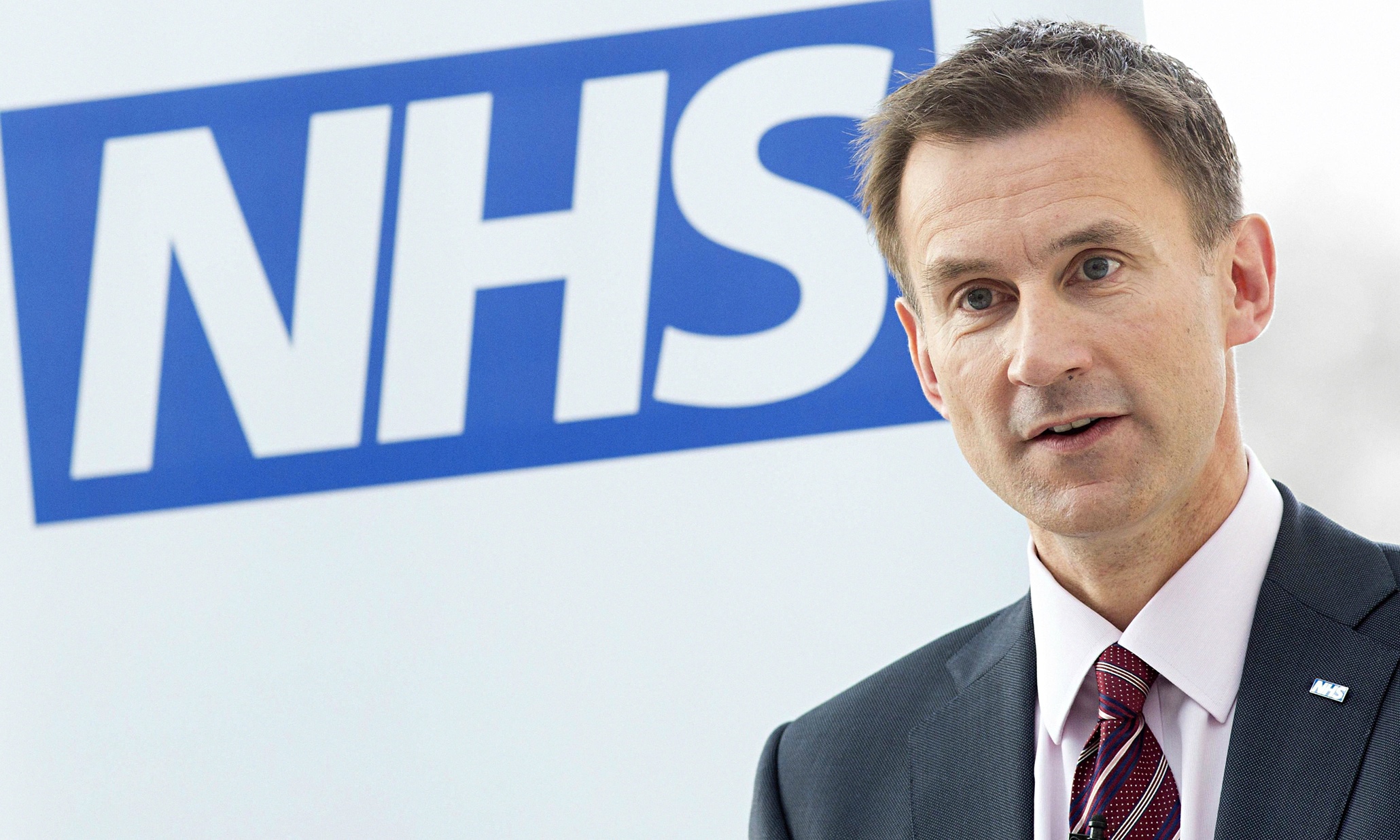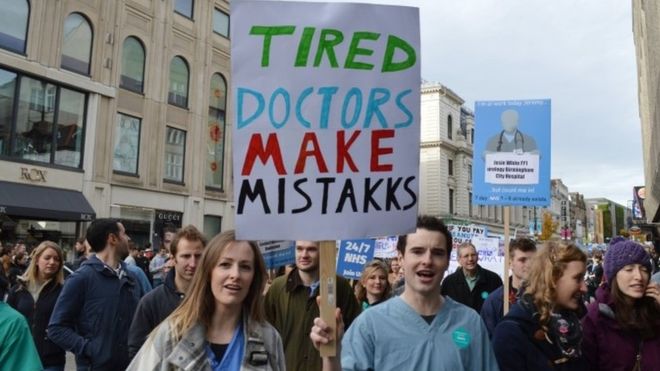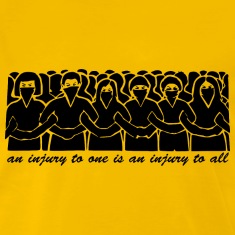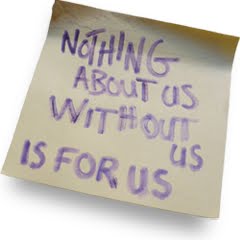A few months ago I wrote a blog suggesting the right approach for the junior doctors was one of subversion and submission. But I think I was wrong. It’s not that I’ve changed my mind on the power of subversion and submission, it’s just that this entire spectacle surrounding the junior doctors, the ‘7 day NHS’, the strikes and the media reporting there of actually affects us all at a profound level.
 This situation exposes something far deeper than just an argument between Jeremy Hunt and the BMA and is far more important than discovering who has the strongest will power. Infact, the BMA have made a major error in targeting Jeremy Hunt so vindictively, because in the final analysis, this isn’t about Hunt at all. Jeremy Hunt can be replaced in a moment, and is likely to be succeeded by a far more robust
This situation exposes something far deeper than just an argument between Jeremy Hunt and the BMA and is far more important than discovering who has the strongest will power. Infact, the BMA have made a major error in targeting Jeremy Hunt so vindictively, because in the final analysis, this isn’t about Hunt at all. Jeremy Hunt can be replaced in a moment, and is likely to be succeeded by a far more robust  Boris Johnson, who will simply pound his fist more visciously. To make Hunt the scape goat narrows this debate to something far too insignificant and actually strengthens the government’s ability to do exactly as they please.
Boris Johnson, who will simply pound his fist more visciously. To make Hunt the scape goat narrows this debate to something far too insignificant and actually strengthens the government’s ability to do exactly as they please.
Sadly, however, all this proves is how defunct our current system of government has always been. What the government really want is a discussion about how we can improve patient access across the weekend timeframe. However, what they did was to decide this is necessary and went ahead to try to fix what is incredibly complex. There was no discssion, no real engagement, no conversation, no asking of the deep questions. Just because we want something, doesn’t mean we can have it! Just because we think something is a good idea, doesn’t mean everyone else will agree! The entire process of enagement and change management is not understood at all. In the first place, the goverment could instead have said to all the hospital trusts across the country what their hopes and intentions were and then waited to see if this was workable, in what way and how much it would cost. But you cannot simply act like Pharoah and expect the brick makers to make ever more bricks with less and less resource available – otherwise, you face an exodus!
place, the goverment could instead have said to all the hospital trusts across the country what their hopes and intentions were and then waited to see if this was workable, in what way and how much it would cost. But you cannot simply act like Pharoah and expect the brick makers to make ever more bricks with less and less resource available – otherwise, you face an exodus!
What this entire debacle demonstrates is just how far free market capitalism has gone in its use of people as biopower to drive the system. The junior doctors of the NHS are nothing more than fodder to make the machine run. It doesn’t matter at all to the government that their lovely idea of a ‘7 day NHS’ is both unaffordable (due to chronic underinvestment in the health service) and unstaffable (due to a combination of under-training of staff across the board, and free market forces which work against people remaining in the UK). What this exposes in its most blatant form, is the chronic and shocking abuse of power, because of the very structures we have in place and the foundations upon which our society is built – namely violence, debt and control. And so, we see the human being reduced to what Hardt and Negri call ‘naked life’.
 The system, to which we must all bow doesn’t care for the needs of the people who work within it. It will force them to submit. Why should doctors (many of whom work for less than the minimum wage, when on call) be allowed time to rest at weekends? Why can’t everybody have routine care through the weekend, just as from monday to friday (even though most of our top clinicians think we need better emergency care and not routine access)? Surely our economy needs this kind of health service? And actually, whilst we’re on it, isn’t it a waste of time, allowing teachers to have weekends off as well? Don’t we need our children to work harder, or at least be given some sort of babysitting service, so we can get more for our pound of flesh from their parents? If we are to have a 24/7 health service, why not a 24/7 education service? Our shops are already open practically 24/7. In this commercial world – shouldn’t everything else follow suit? No, no and NO!!
The system, to which we must all bow doesn’t care for the needs of the people who work within it. It will force them to submit. Why should doctors (many of whom work for less than the minimum wage, when on call) be allowed time to rest at weekends? Why can’t everybody have routine care through the weekend, just as from monday to friday (even though most of our top clinicians think we need better emergency care and not routine access)? Surely our economy needs this kind of health service? And actually, whilst we’re on it, isn’t it a waste of time, allowing teachers to have weekends off as well? Don’t we need our children to work harder, or at least be given some sort of babysitting service, so we can get more for our pound of flesh from their parents? If we are to have a 24/7 health service, why not a 24/7 education service? Our shops are already open practically 24/7. In this commercial world – shouldn’t everything else follow suit? No, no and NO!!
 This is why we need a revolution of solidarity and resistance. We need a people movement who will stand together and be brave enough to say that there is a different way to see the world and a new way to live within it. Our naked life itself, although currently abused, can become for us our greatest power. Our naked life can expose the truth of just how abusive our systems have become. Our naked life, when combined with the indestructable force of kenotic love, becomes the very agent of change that we need.
This is why we need a revolution of solidarity and resistance. We need a people movement who will stand together and be brave enough to say that there is a different way to see the world and a new way to live within it. Our naked life itself, although currently abused, can become for us our greatest power. Our naked life can expose the truth of just how abusive our systems have become. Our naked life, when combined with the indestructable force of kenotic love, becomes the very agent of change that we need.
So, what next for the junior doctors? Should they strike next week, including for emergency care? Are they ready for the media (who have lost the art of journalism) to turn against them? Are they ready for the storm that will ensue? Well, lives have already very sadly been lost. How many more can stand under the strain? What if the public turn against their heros?
It is time for something deeper to take place. It is time for solidarity. It is time for those of us in senior positions to cover shifts and show our unreserved support. It is time for the public, not just teachers, but across the board, to stand with the juniors. As my friend, Julie Tomlin showed me, we have to learn from the arab spring that one march alone will not do it. March after march after march may be needed. And singing too!! Let songs be heard on the streets! And to  really demonstrate the power of naked life……how about naked marches?!! (I grew up in Coventry, and so the story of Lady Godiva is in my blood – nakedness overcame oppression once before!). Or maybe the staff of the NHS should all turn up to work with no clothes on?!! How about people stripping off at least to their underwear to expose both the fragility and the power of naked life?!
really demonstrate the power of naked life……how about naked marches?!! (I grew up in Coventry, and so the story of Lady Godiva is in my blood – nakedness overcame oppression once before!). Or maybe the staff of the NHS should all turn up to work with no clothes on?!! How about people stripping off at least to their underwear to expose both the fragility and the power of naked life?!
There is a different way for humanity. We can free ourselves from the oppressive yolk that seeks to divide and rule us. Perhaps, the Junior Doctors could be more creative and expose the deep structures of oppression that lie beneath the calls for this ‘7 day NHS’? Now is the time for subversion, for exposing just how unjust our systems are. But subversion alone will not suffice. We need solidarity and resistance. So, who will stand and march with the Junior Doctors (naked if need be?!) for an altogether different future?
 I went to London a couple of weeks ago for the IHI (Institute for Health Innovation) conference in London – Quality Forum 2017. The focus was on Quality and Safety in Healthcare, with some hugely surprising and refreshing perspectives from around the world. It was absolutely great and I learnt loads. I’ve tried to distill my learning from the time into a single sheet diagram. My hope, over the next few blogs is to unpack this a bit more, but here is a very brief summary:
I went to London a couple of weeks ago for the IHI (Institute for Health Innovation) conference in London – Quality Forum 2017. The focus was on Quality and Safety in Healthcare, with some hugely surprising and refreshing perspectives from around the world. It was absolutely great and I learnt loads. I’ve tried to distill my learning from the time into a single sheet diagram. My hope, over the next few blogs is to unpack this a bit more, but here is a very brief summary:







 This situation exposes something far deeper than just an argument between Jeremy Hunt and the BMA and is far more important than discovering who has the strongest will power. Infact, the BMA have made a major error in targeting Jeremy Hunt so vindictively, because in the final analysis, this isn’t about Hunt at all. Jeremy Hunt can be replaced in a moment, and is likely to be succeeded by a far more robust
This situation exposes something far deeper than just an argument between Jeremy Hunt and the BMA and is far more important than discovering who has the strongest will power. Infact, the BMA have made a major error in targeting Jeremy Hunt so vindictively, because in the final analysis, this isn’t about Hunt at all. Jeremy Hunt can be replaced in a moment, and is likely to be succeeded by a far more robust  Boris Johnson, who will simply pound his fist more visciously. To make Hunt the scape goat narrows this debate to something far too insignificant and actually strengthens the government’s ability to do exactly as they please.
Boris Johnson, who will simply pound his fist more visciously. To make Hunt the scape goat narrows this debate to something far too insignificant and actually strengthens the government’s ability to do exactly as they please. place, the goverment could instead have said to all the hospital trusts across the country what their hopes and intentions were and then waited to see if this was workable, in what way and how much it would cost. But you cannot simply act like Pharoah and expect the brick makers to make ever more bricks with less and less resource available – otherwise, you face an exodus!
place, the goverment could instead have said to all the hospital trusts across the country what their hopes and intentions were and then waited to see if this was workable, in what way and how much it would cost. But you cannot simply act like Pharoah and expect the brick makers to make ever more bricks with less and less resource available – otherwise, you face an exodus! The system, to which we must all bow doesn’t care for the needs of the people who work within it. It will force them to submit. Why should doctors (many of whom work for less than the minimum wage, when on call) be allowed time to rest at weekends? Why can’t everybody have routine care through the weekend, just as from monday to friday (even though most of our top clinicians think we need better emergency care and not routine access)? Surely our economy needs this kind of health service? And actually, whilst we’re on it, isn’t it a waste of time, allowing teachers to have weekends off as well? Don’t we need our children to work harder, or at least be given some sort of babysitting service, so we can get more for our pound of flesh from their parents? If we are to have a 24/7 health service, why not a 24/7 education service? Our shops are already open practically 24/7. In this commercial world – shouldn’t everything else follow suit? No, no and NO!!
The system, to which we must all bow doesn’t care for the needs of the people who work within it. It will force them to submit. Why should doctors (many of whom work for less than the minimum wage, when on call) be allowed time to rest at weekends? Why can’t everybody have routine care through the weekend, just as from monday to friday (even though most of our top clinicians think we need better emergency care and not routine access)? Surely our economy needs this kind of health service? And actually, whilst we’re on it, isn’t it a waste of time, allowing teachers to have weekends off as well? Don’t we need our children to work harder, or at least be given some sort of babysitting service, so we can get more for our pound of flesh from their parents? If we are to have a 24/7 health service, why not a 24/7 education service? Our shops are already open practically 24/7. In this commercial world – shouldn’t everything else follow suit? No, no and NO!! This is why we need a revolution of solidarity and resistance. We need a people movement who will stand together and be brave enough to say that there is a different way to see the world and a new way to live within it. Our naked life itself, although currently abused, can become for us our greatest power. Our naked life can expose the truth of just how abusive our systems have become. Our naked life, when combined with the indestructable force of kenotic love, becomes the very agent of change that we need.
This is why we need a revolution of solidarity and resistance. We need a people movement who will stand together and be brave enough to say that there is a different way to see the world and a new way to live within it. Our naked life itself, although currently abused, can become for us our greatest power. Our naked life can expose the truth of just how abusive our systems have become. Our naked life, when combined with the indestructable force of kenotic love, becomes the very agent of change that we need. really demonstrate the power of naked life……how about naked marches?!! (I grew up in Coventry, and so the story of Lady Godiva is in my blood – nakedness overcame oppression once before!). Or maybe the staff of the NHS should all turn up to work with no clothes on?!! How about people stripping off at least to their underwear to expose both the fragility and the power of naked life?!
really demonstrate the power of naked life……how about naked marches?!! (I grew up in Coventry, and so the story of Lady Godiva is in my blood – nakedness overcame oppression once before!). Or maybe the staff of the NHS should all turn up to work with no clothes on?!! How about people stripping off at least to their underwear to expose both the fragility and the power of naked life?!


 een willing to be humble and be impacted by these stories. I am grateful for relationships and partnerships that are being established between those of us who provide services and those who use them. I am grateful for the tenacity of people who want to see our cultures change. I am grateful for ‘The Leeds Poverty Truth Challenge’ and its far reaching consequences. I am grateful for the opportunity to break down barriers and find positive ways forward. I am grateful for the transformative power of listening and the change that can happen when we really encounter another human being. Better Care Together is so much better when we work together with those we are trying to serve.
een willing to be humble and be impacted by these stories. I am grateful for relationships and partnerships that are being established between those of us who provide services and those who use them. I am grateful for the tenacity of people who want to see our cultures change. I am grateful for ‘The Leeds Poverty Truth Challenge’ and its far reaching consequences. I am grateful for the opportunity to break down barriers and find positive ways forward. I am grateful for the transformative power of listening and the change that can happen when we really encounter another human being. Better Care Together is so much better when we work together with those we are trying to serve. If you take the work of Steve Peters (of “The Chimp Paradox” fame) seriously, which I do, then you can see Chimps at work everywhere in the NHS right now (and I’m not taking a cheap shot at Jeremy Hunt). For those of you, who have no idea what I’m talking about, then do read the book….but a brief precis is this: each of us are two people – we are both simultaneously an emotionally driven, primal chimp and a more rational human being. When faced with difficult circumstances, our chimps all too easily take over and our behaviour is driven by our emotions, because our human also feels insecure and we lose hold of our values (the computer part of our brains) which is able to alter our chimp behaviour.
If you take the work of Steve Peters (of “The Chimp Paradox” fame) seriously, which I do, then you can see Chimps at work everywhere in the NHS right now (and I’m not taking a cheap shot at Jeremy Hunt). For those of you, who have no idea what I’m talking about, then do read the book….but a brief precis is this: each of us are two people – we are both simultaneously an emotionally driven, primal chimp and a more rational human being. When faced with difficult circumstances, our chimps all too easily take over and our behaviour is driven by our emotions, because our human also feels insecure and we lose hold of our values (the computer part of our brains) which is able to alter our chimp behaviour. feel about what is happening in General Practice, Community Nursing/Therapy and indeed the NHS at large and it becomes easy to function out of raw emotion, heading into ‘rant mode’ or a strong defensive posture with the rest of my pride. But I have found it brings division. It pits my practice against another or General Practice at scale against the Hospital Trust or the government or whoever. But it doesn’t actually solve anything. It stares the problem in the face and hollers at it or throws faeces at it, and other than being cathartic (which has it’s place for a while), it doesn’t engage with a creative or collaborative process about how we face the future. The facts are right in front of us, and there is some thought about how to make General Practice strong enough to survive, be that through giant mergers or the formation of federations. Here in Morecambe Bay, we are experimenting with both those options and also trying to work in Integrated Care Communities (incorporating all our community partners) according to geographical locations.
feel about what is happening in General Practice, Community Nursing/Therapy and indeed the NHS at large and it becomes easy to function out of raw emotion, heading into ‘rant mode’ or a strong defensive posture with the rest of my pride. But I have found it brings division. It pits my practice against another or General Practice at scale against the Hospital Trust or the government or whoever. But it doesn’t actually solve anything. It stares the problem in the face and hollers at it or throws faeces at it, and other than being cathartic (which has it’s place for a while), it doesn’t engage with a creative or collaborative process about how we face the future. The facts are right in front of us, and there is some thought about how to make General Practice strong enough to survive, be that through giant mergers or the formation of federations. Here in Morecambe Bay, we are experimenting with both those options and also trying to work in Integrated Care Communities (incorporating all our community partners) according to geographical locations. If we are going to find solutions to the needs of the people we serve and develop together (no matter what is being shaped from the centre) a future healthcare model that works, GPs may need to let go of our power, as we have known it and embrace a different way of being. I think a possible solution lies with the co-operative movement as this would allow a truly integrative model to develop that benefits all our workers, no matter what their role, giving us the cultural environment in which innovation, excellence, learning, creativity and compassion could really flourish. Due to the nature of co-operatives and the principles at their core, a powerful force could be released which provides alternative solutions for a more equitable society.
If we are going to find solutions to the needs of the people we serve and develop together (no matter what is being shaped from the centre) a future healthcare model that works, GPs may need to let go of our power, as we have known it and embrace a different way of being. I think a possible solution lies with the co-operative movement as this would allow a truly integrative model to develop that benefits all our workers, no matter what their role, giving us the cultural environment in which innovation, excellence, learning, creativity and compassion could really flourish. Due to the nature of co-operatives and the principles at their core, a powerful force could be released which provides alternative solutions for a more equitable society. styles, from John Lewis to Mondragon, or the model adopted by Jos de Blok in the Netherlands. But the reason I like it so much, is that it takes power from the few and shares it with the many. It allows for a different style of leadership and a different mode of making decisions. Collaborative conversations and compassionate care of one another in providing care to the wider community becomes the order of the day with leadership that is both clinical and managerial but modeled on financial benefits for everybody and cooperation of wider teams of people.
styles, from John Lewis to Mondragon, or the model adopted by Jos de Blok in the Netherlands. But the reason I like it so much, is that it takes power from the few and shares it with the many. It allows for a different style of leadership and a different mode of making decisions. Collaborative conversations and compassionate care of one another in providing care to the wider community becomes the order of the day with leadership that is both clinical and managerial but modeled on financial benefits for everybody and cooperation of wider teams of people. There are draw backs and co-operatives are not perfect, but they are a solution that should be seriously considered as General Practice tries to navigate itself into the future. They can be complex to set up, but I would argue that complexity is worth it when it offers a solution that lasts longer than a more straight forward quick-fix that may not make it past a decade or two. Are we brave enough to explore solutions that dis-empower us for the sake of a better future for everyone?
There are draw backs and co-operatives are not perfect, but they are a solution that should be seriously considered as General Practice tries to navigate itself into the future. They can be complex to set up, but I would argue that complexity is worth it when it offers a solution that lasts longer than a more straight forward quick-fix that may not make it past a decade or two. Are we brave enough to explore solutions that dis-empower us for the sake of a better future for everyone?

 the Nation State is beginning to crumble all around us. Let me just repeat that difficult statement in another way. The grandfather that is the Nation State is now utterly riddled with a cancer and it is dying. The cancer, like all cancers needs ever increasing growth in order to sustain it’s life and our economy is set up to feed it, but even built on the pyramid of power, control and debt, it can no longer survive. Like any dying man, it is holding on for dear life and as it does so, it puts the squeeze ever tighter on to health, education and other public services, pretending it is still powerful, controlling public services through the slashing of budgets and ever tighter and undeliverable targets whilst not actually dealing with it’s debt issue at all, but telling us all a story that it is. And the mouth of
the Nation State is beginning to crumble all around us. Let me just repeat that difficult statement in another way. The grandfather that is the Nation State is now utterly riddled with a cancer and it is dying. The cancer, like all cancers needs ever increasing growth in order to sustain it’s life and our economy is set up to feed it, but even built on the pyramid of power, control and debt, it can no longer survive. Like any dying man, it is holding on for dear life and as it does so, it puts the squeeze ever tighter on to health, education and other public services, pretending it is still powerful, controlling public services through the slashing of budgets and ever tighter and undeliverable targets whilst not actually dealing with it’s debt issue at all, but telling us all a story that it is. And the mouth of 



 h and among the communities most affected. Leaders must learn to ‘hold the space open’ for the new to emerge. It will mean understanding that we must make choices about which targets we do and don’t decide to meet, prioritising some services over others and taking better care of ourselves individually and in community. But it is not a time to lose hope! There is much goodness to come, much rediscovering to take place. Much creative reimagining to enjoy. Many songs to be sung. So, let’s face the music and dance.
h and among the communities most affected. Leaders must learn to ‘hold the space open’ for the new to emerge. It will mean understanding that we must make choices about which targets we do and don’t decide to meet, prioritising some services over others and taking better care of ourselves individually and in community. But it is not a time to lose hope! There is much goodness to come, much rediscovering to take place. Much creative reimagining to enjoy. Many songs to be sung. So, let’s face the music and dance.